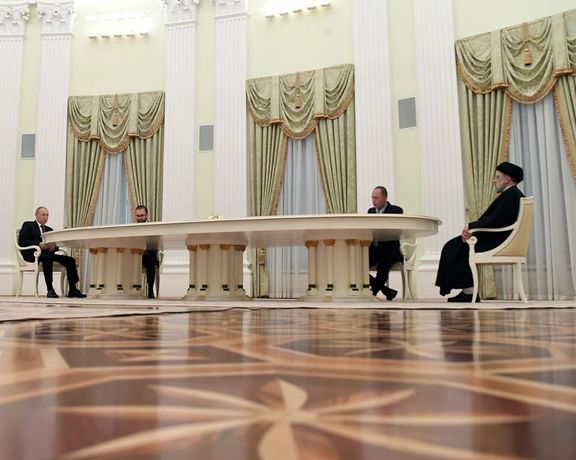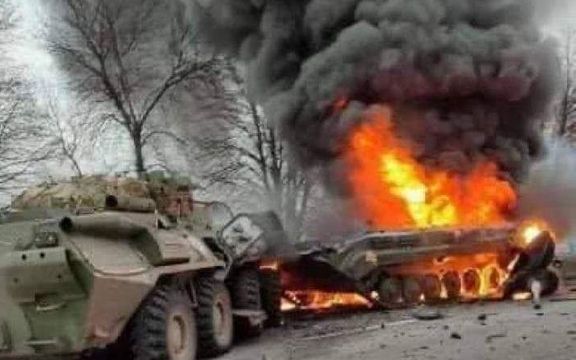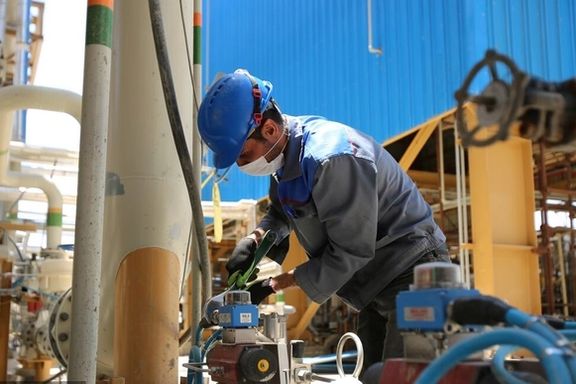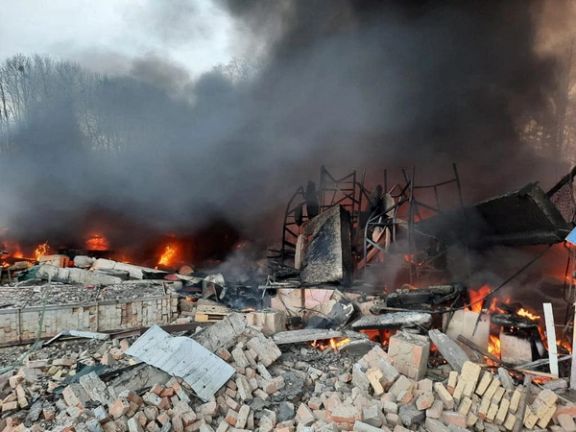Iran's President Tells Putin NATO’s Expansion Is 'Serious Threat'

Iranian President Ebrahim Raisi has told Russian President Vladimir Putin in a phone call that NATO's expansion was a "serious threat" to the region's security and stability.

Iranian President Ebrahim Raisi has told Russian President Vladimir Putin in a phone call that NATO's expansion was a "serious threat" to the region's security and stability.
"NATO's expansion eastward creates tension and is a serious threat to the stability and security of independent states in various areas," Raisi was quoted by Iranian media as saying following Russia's military attack on Ukraine on Thursday.
The Iranian foreign minister Hossein Amir-Abdollahian had said earlier that NATO and US are to blame for the Ukraine crisis.
Some in Iranian media and hundreds of social media users criticized the government for statements showing support for Russia in invading Ukraine.
"I hope what is happening will benefit peoples and the entire region," Raisi said as war unfolded and there were reports of dozens of Ukrainian civilians killed by Russian attacks.
Russia is an ally and a diplomatic supporter of the Islamic Republic. The two countries intervened in the Syrian civil war and are believed to be responsible for the deaths of tens of thousands of Syrian civilians.
Russia is also supporting Iran in nuclear talks with the United States as it also plays a mediating role between the Biden Administration and Tehran.

The Russian embassy in Iran has rejected as fake videos published by IRGC-affiliated Tasnim news showing Russian fighter jets in the skies over Ukrainian.
The twitter account of the embassy published a post on Thursday, stating that the videos published by Tasnim with title “Massive presence of the Russian fighter aircrafts and bombers in the Ukrainian sky” is fake and a part of anti-Russian propaganda.
The embassy said that the video is about an aerial parade in Moscow on the occasion of the Victory Day for the Great Patriotic War (1941-1945) and sound is a montage.
It called on the news agency to publish proven information from reliable sources in the future.
Tasnim removed the item from its website and published some other videos showing the explosions and sirens heard in Ukraine.
Tasnim is a website that routinely spreads the propaganda of the Islamic Republic and the IRGC. As the Russian invasion of Ukraine began on Thursday it echoed the official line blaming NATO and US “provocations” for the crisis in Ukraine. The IRGC-linked website apparently published the video to promote pro-Russia propaganda but inadvertently annoyed the Russian embassy.
Earlier in the day, Iran once again reiterated support for Russia in the Ukraine conflict, saying the crisis is rooted in NATO's provocations.

Iran's foreign minister has supported Russia's invasion of Ukraine by casting the blame on NATO and the US, but not everyone in Iran agrees with his position.
"The Ukraine crisis is rooted in NATO's provocations. We don't believe that resorting to war is a solution. Imperative to establish ceasefire and to find a political and democratic resolution," Foreign Minister Hossein Amir-Abdollahian tweeted Thursday.
Mostafa Arani, assistant chief editor of 7Sobh newspaper, in a tweet referred to Amir-Abdollahian's remark saying he avoided mentioning Russia's role in the crisis and only blamed the US and NATO. "Even [Russian Foreign Minister] Sergei Lavrov can't defend Russia as Amir-Abdollahian has done,” he wrote.
Unlike other media outlets, Iran's state broadcaster (IRIB), state-affiliated media such as Fars and Tasnim news agencies, and others associated with hardliners have so far markedly avoided the use of the word "attack" for the Russian invasion. Instead, they refer to the attack as "Russia's special military operations in eastern Ukraine".
The official stance has angered many who find the reporting very biased. Reza Ghobishavi, deputy editor of conservative Asr-e Iran news website, also criticized the media that appear to have sided with Russia and said they had "sacrificed their credibility by siding with Russian President Vladimir Putin".
In a rare incident, Hasan Beheshtipour, a conservative political analyst who often appears on IRIB programs for comments, strongly criticized Russia's invasion of Ukraine and Iran's official stance in a live program. "Invasion whether by the US or Russia is not defensible in any way… Why are you defending Russia? How do you know that Russia will not do the same to Iran some day?" he asked.
"The IRIB is reporting the situation as if it were [the mouthpiece] of a Russian colony," former conservative lawmaker Ali Motahari said in a tweet Thursday.
Motahari also said Iran should condemn the Russian invasion of Ukraine and show its independence. "We must always remember how [Tsarist] Russia took Georgia, Azerbaijan, and Armenia from Iran [in early 19th century] and how the Soviets backed the invasion of Iran by Saddam [Hussein]," he added.
Others have also pointed out Iran's own history with Russia. "We were Russia's neighbors too. They [imposed] the Golestan and Torkmanchay treaties [in the 18th century], occupied Iranian territories during the WWI and WWII, and shelled the Razavi Shrine [in Mashhad]," sociologist Mohammad Fazeli wrote on Twitter. "At least do not give recognition to this military invasion. The logic behind the invasion of Iraq, Afghanistan and Ukraine is the same whether it's by the US or Russia."
Conservative journalist Mohammad Mohajeri in a tweet said he wished his country's foreign minister "had the guts" to condemn Russia's invasion of another country. Mohajeri accused the foreign policy apparatus of lacking "dignity and wisdom" and demanded an explanation of Iran's official stance.
The diplomatic editor of hardliner Tabnak news website, Mostafa Najafi, however, responded to Mohajeri that Iran's condemnation of the invasion would mean taking the West's side. "Why should Iran take the West's side in this matter when it is under their strictest sanctions? It would be best neither to condemn and take the West's side, nor to align ourselves with Russia. What matters is Iran's interests and national security," he argued.
Meanwhile, supporters of former President Mahmoud Ahmadinejad on social media said the current situation is proof of his claim a month ago that Russia and the US had made a "dirty deal" to divide Ukraine and Iran between themselves. "So far half of his prediction proved to be correct," a supporter tweeted.

A member of the Tehran’s Chamber of Commerce says the country's banks do not have enough money to provide loans and credits to the manufacturing sector.
In an interview with ISNA news agency published on Thursday, Abbas Argoun said that the 40-percent rate of annual inflation and the growth of operating expenses in various sectors have left banks with no money to finance industrial producers.
Financing is one of the main components for enterprises to remain afloat, “both for the production and current expenses”, he said, noting that “the 40-percent inflation rate in the country means that an enterprise needs to spend 40% more just to be able to repeat last year's performance”.
Argoun added that financing the manufacturing sector through investment or the stock market is not possible for many companies, so the banking system is tasked with the burden of providing the capital, “and due to the limitations of the capital market, this is very difficult”.
He noted that “the banks are the only hope for economic enterprises” while they are “faced with serious problems due to internal and external pressures, practically leaving them with no money to give to producers and economic enterprises”.
On Monday, Speaker of Parliament Mohammad Bagher Ghalibaf informed lawmakers that he received a letter from Khamenei asking the legislature and the presidential administration not to make financial demands from banks that are beyond their resources to fulfill.

Global oil prices jumped to $105 a barrel, the highest point since 2014, as the Russian invasion of Ukraine led to fears of disruption to world supplies.
Although the West has not threatened direct sanctions on Russia’s energy exports, but other sanctions can impact deliveries.
"If sanctions affect payment transactions, Russian banks and possibly also the insurance that covers Russian oil and gas deliveries, supply outages cannot be excluded," Reuters quoted Commerzbank analyst Carsten Fritsch as saying.
At least three major buyers of Russian oil were unable to open letters of credit from Western banks to cover purchases on Thursday, sources told Reuters.
Analysts believe that Brent is likely to remain above $100 a barrel until significant alternative supplies become available from OPEC, US shale or Iran, for example.
Negotiations over Iran’s expanding nuclear program since last April continue with no final result. Although progress has been made, diplomats say some significant issues remain to be resolved. An agreement will lift US sanctions and allow Iran to add to global oil supplies, although its capacity remains limited.
Analysts are warning of inflationary pressure on the global economy from $100 oil, especially for Asia, which imports most of its energy needs.
China has been buying more Iranian oil clandestinely in defiance of US sanctions reportedly building up its reserves in past few months.

Iran has once again reiterated support for Russia in the Ukraine conflict, saying the crisis is rooted in NATO's provocations.
Foreign Minister Hossein Amir-Abdollahian said in a tweet on Thursday however that Tehran doesn't believe that “resorting to war is a solution”.
He also stressed the need for an “imperative to establish ceasefire and to find a political and democratic resolution”.
Also on Thursday, Foreign Ministry spokesman Saeed Khatibzadeh said that Tehran is monitoring Ukraine developments with deep concern, noting that “US-led provocations” have created a situation which is taking Eurasia toward an all-out crisis.
Khatibzadeh said Iran urges both sides to stop armed conflict and declare ceasefire to start talks.
He also urged all Iranian citizens living in Ukraine to stay away from dangerous areas, adding that the Foreign Ministry is trying to obtain necessary permissions for one or more special flights to evacuate Iranians from some parts of Ukraine.
Iran’s embassy in Kiev issued a statement on Wednesday, calling on Iranian nationals livening in Ukraine, especially students, to leave the country "temporarily".
Early on Thursday, Russian President Vladimir Putin announced a “special military operation” in the eastern Ukraine regions of Donetsk and Lugansk, claiming that he had ordered the operation after the leaders of the self-proclaimed republics of asked the Kremlin for military assistance.